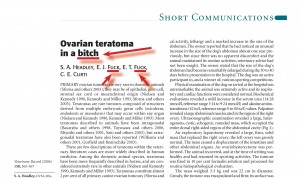 When Luc – a reader of this blog – pointed me a study containing the words “fuck, fuck, bitch”, I thought it was another sensational joke (do you remember the case of Stronzo Bestiale?).
When Luc – a reader of this blog – pointed me a study containing the words “fuck, fuck, bitch”, I thought it was another sensational joke (do you remember the case of Stronzo Bestiale?).Following his cue, with some skepticism I typed those 3 words on PubMed, the most important database on biomedical research worldwide. And I got the first surprise: the research really exists (click to enlarge).
It’s entitled “Ovarian teratoma in a bitch” and is signed by ,,, C. E. Curti. The study was published in 2006 by “Veterinary record“, the Journal of the British veterinarians. In fact, bitch means both “female dog”, as well is a pejorative (a woman who is belligerent, unreasonable, malicious, a control freak, rudely intrusive or aggressive).
Then, the research was about ovarian cancer. But the authors Fuck E. J., and. T. Fuck? I was sure they were invented: the research title was, probably, an irresistible temptation for the true author of the paper.
Maybe there was another scientific joke to report about. So I set out on the trail of the first author, Headley, and it was not easy to find him with just the initials. Finally I found him: he is Selwyn Arlington Headley, an adjunct professor in the Department of Veterinary Preventive Medicine, State University of Londrina in Paranà, Brazil.
 And his response was another surprise: “The research is not a joke, and I am the lead author of it. The two authors surnames, which are not unusual, are really Fuck and Fuck: they are the owners of a veterinary hospital in southern Brazil”. For the record, they’re called Egon José Fuck, and Eliane Miranda Thomaselli Fuck (click to enlarge). So, this time the credibility of science is safe: no one has attempted to mock the scientific controls system. But why not entitle the research “Ovarian Teratoma in a German shepherd”? That research would have had a less embarrassing impact. But maybe it would not have passed into history.
And his response was another surprise: “The research is not a joke, and I am the lead author of it. The two authors surnames, which are not unusual, are really Fuck and Fuck: they are the owners of a veterinary hospital in southern Brazil”. For the record, they’re called Egon José Fuck, and Eliane Miranda Thomaselli Fuck (click to enlarge). So, this time the credibility of science is safe: no one has attempted to mock the scientific controls system. But why not entitle the research “Ovarian Teratoma in a German shepherd”? That research would have had a less embarrassing impact. But maybe it would not have passed into history.
What moral to draw from this story? Vulgar surnames do exist: professor Mark Liberman, linguist at University of Pennsylvania, noted the case of Professor Connard (dickhead), author of thousands of publications (indeed, they exist, because there is more of one). And Corey Bradshaw, Director of the Environment Institute in Adelaide (Australia) in an ironic article posted on his blog has listed dozens of (real) researches signed by: Bastard, Crap, Dick, Junk, Prick … Reality, in few words, exceeds imagination.
Speaking about signatures, after Stronzo Bestiale case there’s another observation to do. My website has been seen by nearly 90 thousand people in few days and the story has gone around the world, inspiring among other things, a fake account on the site weibo.com in China (click to enlarge).
Professor Bestiale has inspired dozens of researchers and science enthusiasts, who reported me the most amazing research.
I remember two that are stuck in my mind:
| the group of galaxies HGC31, in a sensational phallic shape (page 17 of the study here: Canada-Usa, 2006, “The astronomical journal”); | |
| and a molecular reaction that seems to come from the imagination of a porno graffiti artist (the study here: Brazil, 2004, “Inorganic chemistry”). |
I asked myself the reasons of this unexpected success. I think people like these stories because they reveal the human side of science, also made of jokes, taunts, oversights, errors or misunderstandings. Even scientists have emotions, they like to joke and play. Just like everyone of us.
[ Italian version here ]
The post The strange case of doctors Fuck & Fuck first appeared on Parolacce.]]> Quando Luc – un lettore di questo blog – mi ha segnalato una ricerca che conteneva le parole “fuck, fuck, bitch” (scopa, scopa,stronza), ho pensato a un altro scherzo clamoroso (ricordate il caso di Stronzo Bestiale?).
Quando Luc – un lettore di questo blog – mi ha segnalato una ricerca che conteneva le parole “fuck, fuck, bitch” (scopa, scopa,stronza), ho pensato a un altro scherzo clamoroso (ricordate il caso di Stronzo Bestiale?).Seguendo la sua indicazione, con un certo scetticismo ho digitato le 3 parole su PubMed, il più importante database sulla ricerca biomedica mondiale. E ho avuto la prima sorpresa: la ricerca esiste davvero (clicca per ingrandire).
Si intitola “Ovarian teratoma in a bitch” ed è firmata da ,,, C. E. Curti. La ricerca era stata pubblicata nel 2006 su “Veterinary record“, il giornale dell’associazione medici veterinari britannici. E infatti, bitch in inglese significa originariamente cagna (femmina del cane), oltre ad avere il senso spregiativo di stronza, strega o puttana (nell’espressione “son of a bitch”, figlio di….).
La ricerca parlava dunque di un tumore alle ovaie. Ma gli autori ,? Ero sicuro che fossero inventati: il titolo dello studio era stato, probabilmente, una tentazione irresistibile per il vero autore della ricerca.
C’era un’altro scherzo scientifico da raccontare? Mi sono messo sulle tracce del primo firmatario Headley, e non è stato facile rintracciarlo con le sole iniziali. Alla fine l’ho trovato: è Selwyn Arlington Headley, professore aggiunto al Dipartimento di Medicina preventiva veterinaria dell’università statale di Londrina nel Paranà, in Brasile.
 La sua risposta, però, è stata l’altra sorpresa: “La ricerca non è affatto uno scherzo, e io ne sono l’autore principale. E i cognomi dei due autori, peraltro non insoliti, sono davvero Fuck e Fuck: sono proprietari di un ospedale veterinario nel Sud del Brasile”. Per la cronaca, si chiamano Egon José Fuck, e Eliane Miranda Thomaselli Fuck (clicca per ingrandire). Dunque, stavolta l’onore della scienza è salvo: nessuno ha tentato di beffare il sistema dei controlli scientifici. Ma perché non intitolare la ricerca “Teratoma ovarico in un pastore tedesco”? Lo studio avrebbe avuto un impatto meno imbarazzante… ma forse non sarebbe passato alla storia.
La sua risposta, però, è stata l’altra sorpresa: “La ricerca non è affatto uno scherzo, e io ne sono l’autore principale. E i cognomi dei due autori, peraltro non insoliti, sono davvero Fuck e Fuck: sono proprietari di un ospedale veterinario nel Sud del Brasile”. Per la cronaca, si chiamano Egon José Fuck, e Eliane Miranda Thomaselli Fuck (clicca per ingrandire). Dunque, stavolta l’onore della scienza è salvo: nessuno ha tentato di beffare il sistema dei controlli scientifici. Ma perché non intitolare la ricerca “Teratoma ovarico in un pastore tedesco”? Lo studio avrebbe avuto un impatto meno imbarazzante… ma forse non sarebbe passato alla storia.
Che morale trarre da questa vicenda? I cognomi volgari esistono davvero: il professor Mark Liberman, linguista all’Università della Pennsylvania, segnalava il caso del professor Connard (testa di cazzo), autore di migiliaia di pubblicazioni (esiste, esiste! anzi: esistono, perché ce n’è più di uno). E Corey Bradshaw, direttore dell’Istituto ambientale di Adelaide (Australia) in un articolo ironico pubblicato sul suo blog ha elencato decine di ricerche (vere) firmate da: Bastard (bastardo), Crap (merda), Dick (cazzo), Junk (balle, pacco), Prick (cazzo)… La realtà, insomma, supera la fantasia. Anche in Italia: in questo post ho censito i cognomi volgari italiani, che sono numerosissimi e molto variegati.
Ma a proposito di firme, c’è da fare un’altra riflessione dopo il caso di Stronzo Bestiale: il mio sito è stato visto da quasi 90mila persone e la storia ha fatto il giro del mondo, ispirando fra l’altro un finto account in Cina sul sito weibo.com (clicca per ingrandire).
Il professor Bestiale ha scatenato decine di ricercatori o appassionati di scienza, che mi hanno segnalato le ricerche più sorprendenti.
Ne ricordo due, che mi sono rimaste stampate nella mente:
| il gruppo di galassie HGC31, raggruppate in una clamorosa forma fallica (a pag. 17 dello studio qui: Canada-Usa, 2006, “The astronomical journal”); | |
| e una reazione molecolare che sembra uscita dalla fantasia porno di un graffitaro metropolitano (qui lo studio: Brasile, 2004, “Inorganic chemistry”). |
Oltre a essermi divertito, mi sono chiesto le ragioni di tanto successo, davvero inaspettato. Credo che queste storie piacciano perché svelano il lato umano della scienza, fatta anche di scherzi, provocazioni, sviste, errori o equivoci. Anche gli scienziati si arrabbiano, si appassionano, hanno emozioni, anche a loro piace scherzare e giocare. Proprio come a tutti noi.
[ English version here ]
The post Lo strano caso dei dottori Fuck & Fuck first appeared on Parolacce.]]>

